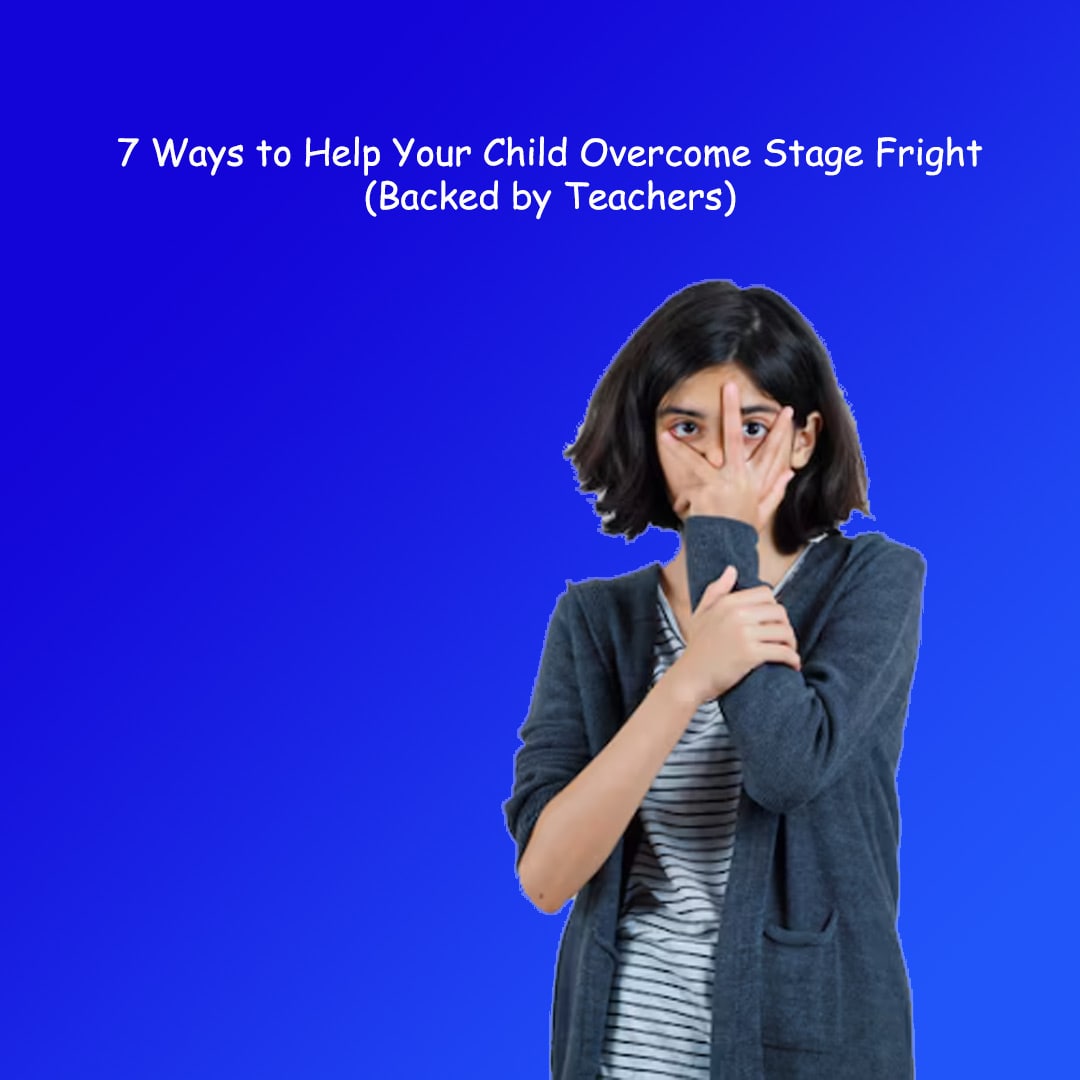Please enter the code we just sent to whatsapp 91-11-46710500 to proceed
Didn't Receive OTP?

Stage fright in kids is far more common than most parents realise. The most talkative, bubbly child may turn stone cold and have no clue how to speak in front of a crowd. Their voice becomes shaky, their hands get cold, and their mind become blank. We, as teachers, witness it all the time, and it is good news because we see that it is all fine, and it is easy to manage.
With the right guidance, your child can build strong public speaking confidence that will help them not only in school but throughout their life. Whether it's reading aloud, acting in a school play, or making a presentation in a class, confidence right before the stage makes kids feel proud and powerful.
The following are 7 strategies for your child to overcome stage fright and shine before an audience.
1. Beginning Small and Growing Progressively.
A child should be comfortable talking in small and safe groups before they can talk in front of a big classroom. Small group or pair-sharing activities are often the starting point for teachers. At home, you can try the same:
Ask your child to make a story for you.
They can narrate them in front of the family. Gradually build up the number of audience.
This step-by-step process will eliminate pressure and make the child feel that he is in charge. Each small success boosts their public speaking confidence, preparing them for bigger moments.
2. Practise Through Play
Children get to learn well when they have fun. With the help of drama games, childish tones, or creative play, one can eliminate the seriousness that is linked to addressing the audience.
Teachers can practice with such activities as:
A. Pass the Emotion (saying the sentence with various tones of emotion)
B. Role Swap Step, where learners can pretend to be teachers or another character.
C. Puppet shows among young children.
At home, try:
The child can be a newsreader
Storytelling with toys
Creating a fake stage out of blankets and pillows.
When kids associate speaking with fun, stage fright in kids naturally decreases.
3. Educate Them on the Secret of Preparation.
Even adults become nervous if they are not prepared. Children feel the same way.
Students are encouraged by teachers to:
Repeat their lines or speech several times.
Divide the content into smaller pieces.
Practice the steps: Beginning - middle - end.
At home, you can:
Make them practice in front of a mirror.
Record their voice to listen to their improvement.
Clap and a cheer!
They become more confident as they have the exact idea of what to look forward to when it becomes a habit of preparation.
4. Provide a Suitable, Non-hostile Audience.
The fear of judgment is the number one cause of stage fright in kids.
This is the reason why the teachers strive so much to create a classroom atmosphere that is both safe and tolerant of errors.
You can do this at home by:
Remaining patient during practice.
Minor faults should not be criticized.
Advocating for support among siblings.
Rewarding hard work rather than achievement.
With an emotionally supported child, he or she is much more likely to step on stage and not fear.
5. Simple Calming Strategies.
Calming techniques before the performance are common among teachers. These are the strategies that help children have control of their nerves.
Try teaching your child:
Immense breathing: Smell the flower, blow the candle.
Grounding: Name 3 things that they can see, 2 that they can touch, 1 that they can hear.
Positive statements: I am courageous, I am able to do it, my voice is valuable.
Such simple tools can transform the feeling of a child before performing before the audience completely.
6. Pay Attention to Connection, Not to Flawlessness.
One of the amazing things that teachers tell students is, we do not want perfect speaking, we want real speaking.
Children think that everybody is staring at them, or judging them, but once they learn or master the art of concentrating on making a connection with the audiencethey feel calm and the performance turns out impressive.
Teach your child to:
Talk as though they were conversing with a friend.
Maintain eye contact with the audience.
Smile before they begin
Use natural gestures, matching their words.
When they switch between “Will I make a mistake? to "Can I connect with my audience?", their public speaking confidence shines.
7. Reward Each Initiative-Big or Small.
The ability to be on stage for even 5 seconds is an achievement for a child. Small wins are always celebrated by teachers since confidence can be built on small steps.
Practice things at home:
Raising their hand in class
Pronouncing their name without stammering.
Reading aloud at the dinner table.
Introduction to the camera for 10 seconds.
Praise will restructure their brain to realize that talking is a success and not a failure.
Read more: Overcoming Stage Fright: Tips and Tricks for Confident Public Speaking
Final Thoughts
Stage fright in kids doesn't disappear overnight. It fades little by little as children feel supported, prepared, and emotionally safe. With patience, small steps, and positive reinforcement, your child can develop strong public speaking confidence that will stay with them throughout their lives.
It is important to remember that children are not born with confidence. It is a thing we make them construct.
And all the words of encouragement you offer them sink into the wall of their strength.
Shape Your Kid's Future with Bambinos Classes | Bambinos.live India's No. 1 English Communication Platform For Kids | Click here to Book a Free Class Limited time offer.